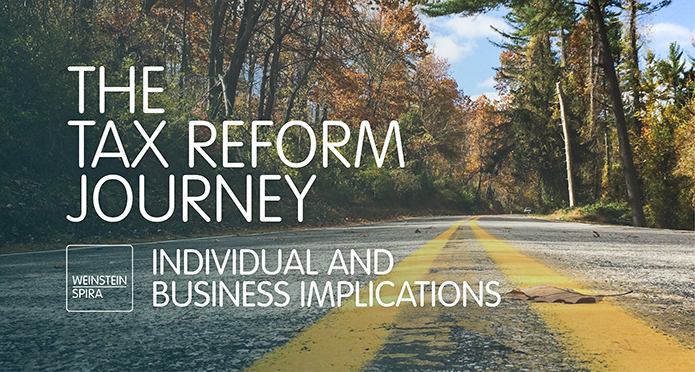We’ve all waited with bated breath and now it’s finally a done deal. After much anticipation and back and forth negotiations, the dust is just starting to settle with respect to the newly passed Tax Cuts and Jobs Act. We don’t yet fully know how the new laws will affect everyone; but, regardless of your personal situation, there will likely be lots of changes and the journey will be different for each individual or business.
While the current tax year filings (for 2017) will mostly be “business as usual,” it behooves us to start thinking and planning ahead in order to be prepared for next year, when the heavy lifting will occur. This article provides a high-level summary of the general changes for business and individual income tax provisions. For specific questions and advice, please contact your Weinstein Spira tax advisor. We are ready with the latest information, as well as tools to interpret various tax issues as they surface over the upcoming year.
Impact on Individuals
The good news for individuals is that most tax rates will go down according to a different set of income tax brackets. However, these gains will be offset by state and local tax (SALT) deductions becoming very limited going forward. Furthermore, local property tax deductions will also be limited—with a $10,000 cap on deductions—adversely affecting those who own high-value homes to varying degrees. So, in some cases, it may very well be a wash, or even a negative net effect compared to previous years.
Since the simplification of filing tax returns is not quite happening, as many had hoped for, we urge individuals to have meetings or call their tax advisor to understand what needs to be done with respect to personal tax planning and related matters. There will likely be clarifications and corrections as the year progresses.
Impact on Businesses
C corporations win big
The biggest win for business is a significant cut in the corporate tax rate, which will go down from 35% to 21%. That’s a huge reduction, which will benefit entities classified as C corporations for tax purposes.
Other entity considerations
Small business entities unfortunately will not be included in this direct corporate tax savings. Does that mean you should become a corporation? Not necessarily, as there are pros and cons to doing so. These are not easy decisions. Before making such changes, we suggest talking to your tax advisor and analyzing if there would be a distinct advantage to your business.
Most small companies are structured as an S corporation, limited liability company (LLC) or limited partnership (LP), with “pass-through” income impacting individual income tax returns via K-1 forms. This is another story, altogether, with a complicated equation and several moving parts to be carefully considered:
- Certain types of pass-through scenarios are in luck, as they will get a 20% deduction, making only 80% of their income taxable.For example, if your company earns $1 MM per year, you would pay 37% on $800,000 under the new tax provisions. This is a very over-simplified example, but it shows the potential impact of the tax reform to pass-through entities. And remember, it does not apply to all types of businesses; it generally needs to be a type of business activity that incurs an expense for wages.
- Additionally, service businesses, such as lawyers, doctors, accountants, etc., are excluded and, therefore, won’t benefit from this change in many cases (depending on the profitability of your venture).
Again, it’s important to talk to your tax advisor to see whether or not you will qualify for this and other business deductions.
Depreciation: capital expenses and real estate investing
Big and small businesses, alike, will now be able to depreciate capital expenditures (such as heavy equipment) in the first year of purchase, instead of spreading out the depreciation over 5-15 years. So, if you’ve been putting off those office computer upgrades or significant equipment purchases, now may be the time to start spending. And, if you’re planning on purchasing real estate, there will be special depreciation rules applicable to those types of purchases.
Repatriation of untaxed foreign earnings
Corporations and individuals that own at least 10% of a foreign corporation will generally be required to tax their pro rata share of historical untaxed foreign earnings. This income will be taxed at a rate of 15.5% or 8%, depending on whether the earnings are attributable to cash or tangible assets, and may apply as early as the 2017 tax filing season.
Your 2018 Agenda
Although there’s no immediate fire drill, the sooner you plan and make decisions according to your special circumstances, the better off you’ll be. As part of your individual/business agenda for 2018, put us on your to-do list for reviewing the tax changes through your unique lens. We’ll begin by looking at how to make the most of your resources (where to spend, how to spend), the best legal structure for your company and how to go about re-structuring, if necessary. This advisory role is an important part of what we do for clients. We’ll also continue to have an open dialogue as we learn together the in’s and out’s as things unfold and more clarity is provided. Let’s get started on this new tax journey today.



